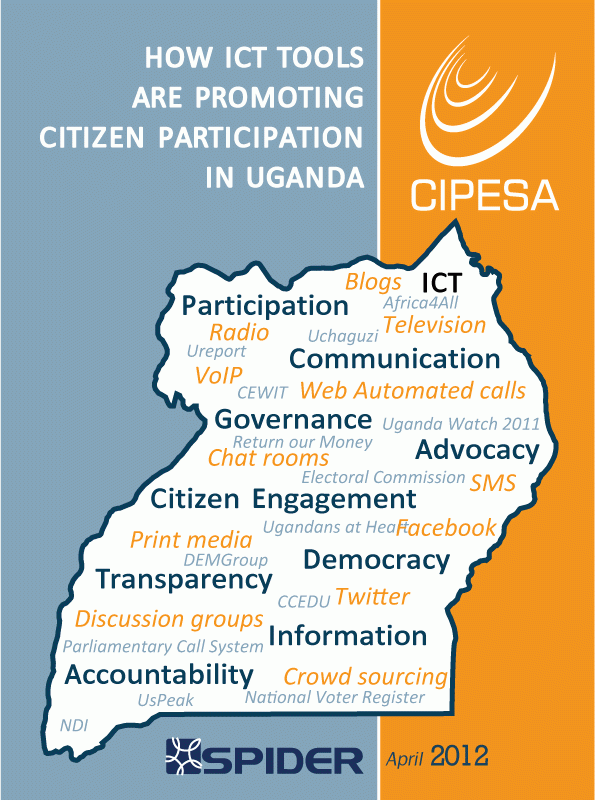In addition to the study assessing Uganda’s Open Government Readiness, the Collaboration on International ICT Policy for East and Southern Africa (CIPESA) assessed citizens’ perceptions on open governance.
Based on a questionnaire, the study established that in Uganda there is a high level of knowledge about open governance, as well as great expectations of the benefits which Open Governance Data (OGD) would bring. Amongst the benefits mentioned were raising accountability by duty bearers, minimising corruption, promoting transparency, encouraging citizen participation in governance, monitoring service delivery, and aiding private sector innovation.
However, concerns were raised about the potential for misrepresentations and misinformation, increase in violent demonstrations as backlash from disgruntled citizens and increased administration costs associated with preparing data for open access. These fears need to be managed by both the state and by civil actors advocating open governance, in order to convince both citizens and government that OGD is for the good of the country.
The study made clear indications of what departments/ ministries should open up their data as a priority, and also identified various forms of data that citizens need to have greater access to. Moreover, the study has shown that the level of openness in government departments is severely low, even though there are laws that call for openness, and despite having clear examples of how increased openness results into public good. Government therefore needs to show greater political will to become more open, and this will need to be manifested in bold actions rather than simple declarations.
Whereas the results are not representative of Ugandan’s perceptions on open governance, they show a critical mass for demand and usage of open government data. The study establishes a key reference point which government should build on to roll out OGD, and which civil society can use in advocating and raising awareness about open governance in Uganda.
The study was conducted in the context of the Association for Progressive Communications (APC) Action Research Network, a project supported by the International Development Research Centre of Canada (IDRC).
Download the full report here.
See also assessment of open government data readiness in Uganda and Q&A with the research coordinator.
Study Shows Uganda is Ready to Implement Open Government Data

A new study conducted by the Collaboration on International ICT Policy for East and Southern Africa (CIPESA) and the Association for Progressive Communications shows that Uganda is ready to implement a national programme of Open Government Data but success will not come easy.
Why should Uganda open up government data (OGD)? Because implementing OGD has been proven to increase transparency in the conduct of public affairs, undercut corruption, enable citizens to reuse information to deliver improved products and services; and leads to improvements in the delivery of education, health and water to citizens.
Conducted between January and April 2012, the study explored the political willingness, public administration readiness, and civil society interest in OGD. The study’s overall objective was to recommend actions needed for the country to implement OGD and move to openness levels that countries such as those grouped under the Open Government Partnership are working to attain.
The study found that some Ugandan institutions are performing well as far as making public their data and information is concerned. Furthermore, the legal and policy environment, infrastructure, and appropriate human resources are in place. However, with no clear structures, data collection guidelines and tools, the quality of data and its output is limited.
At the top leadership, it was evident that whereas there was willingness to open up government data, this was yet to translate into clear and total commitment. At the middle level, there existed the competence to implement OGD, but the lack of clear goodwill at the Executive level was an impediment.
Fear of the negative effects that the opening up of government data and information might have was noted as a bottleneck. With regard to competence to re-use the data by the public and private sectors, it was evident that there was substantial capacity to use and re-use the open data.
The study made a number of recommendations, one of the most important being the call on government to fully commit to open government. The commitment at the top executive level will pave the way for a number of opportunities for government, private and public sectors.
Besides, there is need to task a government body, preferably the National Information Technology Authority –Uganda (NITA-U), as the in-charge of championing OGD in the country There is also need for awareness creation for public officers, citizens, and private sector on the benefits of OGD. On the whole, it was recognised that a number of initiatives have been running but without effective coordination and direction. It is imperative therefore that leadership is established to champion OGD in a structured and coordinated manner.
The findings of the study will form the basis of advocacy, awareness raising, and network building of CIPESA’s wider campaign in promoting open governance in Uganda and the use of ICTs in democracy and governance.
The study was conducted in the context of the Association for Progressive Communications (APC) Action Research Network, a project supported by the International Development Research Centre of Canada (IDRC).
Download the full report here.
See also citizen’s perceptions on open government data and Q&A with the research coordinator.
New Report Shows How ICT is Aiding Citizen Participation in Uganda
A new report by the Collaboration on International ICT Policy in East and Southern Africa (CIPESA) illustrates how Information and Communication Technologies (ICT) are aiding citizen participation in Uganda, but also points to the challenges that need to be overcome for these technologies to have a wider impact on governance.
The report reviews various ICT tools being used to promote transparency, accountability, and citizen participation in Uganda. It examines the utility and shortcomings of these tools, the challenges they face, and the factors contributing to their success. Furthermore, it offers suggestions for improving the utility, reach, and, hopefully, the success of initiatives that utilise ICT to improve citizen participation.Based on the 24 ICT tools assessed, seven main categories of uses of tools were identified: Information provision; Election monitoring; Lobbying and activism; Voter registration; Elections reporting; Citizen policing; and Civic participation in the post-election period.Innovations especially with mobile telephony and interactive mapping have showcased how ICT can help improve transparency and accountability in the delivery of public services. In the run up to Uganda’s 2011 general elections, ICT tools were used broadly, for campaigning, tallying results, monitoring the actions of political groups and the electoral body, for civic education, and for activism. The tools included mobile phones, automated calls, and crowd sourcing platforms, radio and television, as well as social media. They contributed to transparency of the polls – but probably not to voter turn-out.However, the most immediate challenge to the adoption of these tools is that few Ugandans are embracing them. In Uganda, market penetration for voice stands at 45% with a population coverage of close to 100%. Mobile accounts for more than 90% of new connections, with 910,000 new subscribers being added each year. While this is providing a solid base in terms of numbers of those who can use the ICT, the figures do not tell the whole story. For example, studies show that nearly half of mobile phone subscribers own at least two SIM cards. Moreover, even among the phone-owning class, for many usage beyond voice (and, well, Facebook and radio) remains limited.And there are yet more challenges. Limitations such as the cost of accessing and using the ICT, language barriers and low literacy levels mainly for the internet and mobile based platforms – as well as minimal attention by government to boosting usage of ICT in governance all hinder the effective use of these tools. This study finds that it is therefore crucial for organisations using ICT for participation and democracy to carry out extensive assessments before deploying the technology, to work with others rather than duplicate efforts, to create awareness and capacity among users, and to continuously assess the impacts the ICT initiatives are creating.This research was made possible by funding from the Swedish Program for ICT in Developing Regions (Spider), which is supporting projects in Kenya, Tanzania, and Uganda, in the areas of education, health, and governance. The results shall directly inform some wider actions in catalysing civic participation and democracy monitoring using ICT, which CIPESA and other SPIDER partners are undertaking in East Africa. Spider has provided seed-funding to a range of organisations that form the ICT4Democracy in East Africa Network (www.ict4democracy.org), who will benefit from this study.
Download the full report here
CIPESA Newsletter September 2011
In this issue of the newsletter, read about concerns that Tanzanian authorities are growing intolerant of online activity deemed critical of the government; the link between ICT and open government; how social media could promote democracy; the challenges of accessing public information in Uganda; the ICT-for Democracy in East Africa project; and the Uganda national internet governance Forum. More
Report of the Uganda Internet Governance Forum 2011
The report of the 4th Uganda Internet Governance Forum organised by the Collaboration on International ICT Policy for East and Southern (CIPESA) in conjunction with the Women of Uganda Network (WOUGNET) and Hive Colab on August 10, 2011, is available for download here


